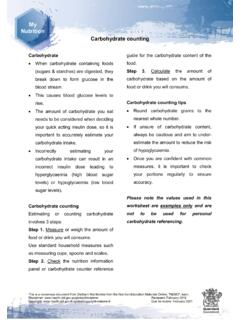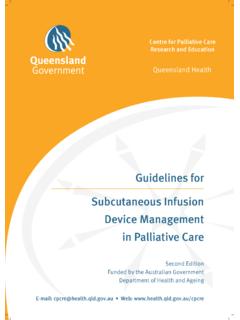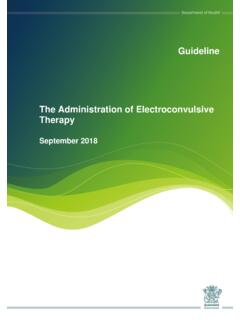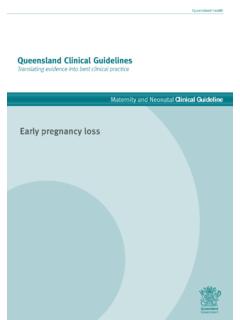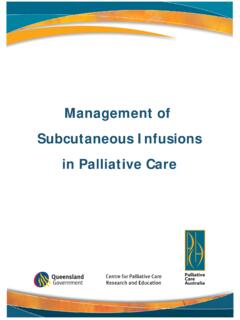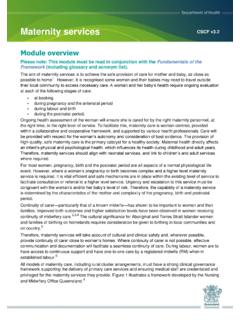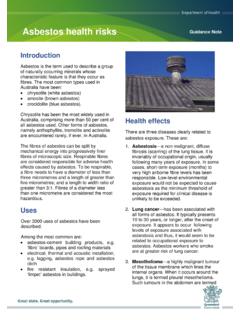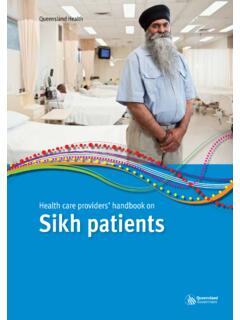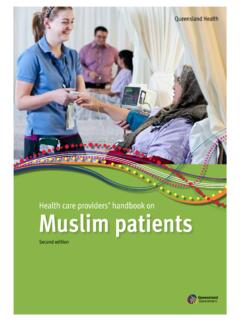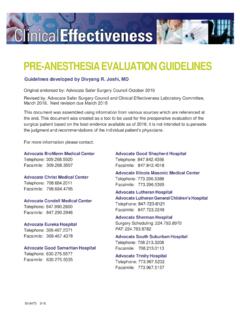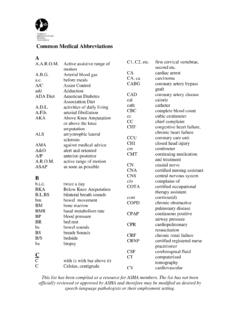Transcription of Caring for a person with Dimentia - Queensland Health
1 Page 31 Caring for a person withDementiaCase studyHarry is an 85 year old man who has been brought to hospital following a fall from a ladder in his back yard. He lives with his wife, Alice, in their own home. He had been attempting to clean out the gutters following a storm. He is not sure how he got to hospital and is not good at providing other Health or family history. On a Mini Mental Status Examination he scored 17 out of 30, which is well under the cut-off score of 24. This indicates that he has possible cognitive impairment.
2 His dislocated shoulder has been reduced under anaesthesia following two unsuccessful attempts at closed has not eaten or taken any fluids since returning to the ward. You become concerned that when his wife leaves after the evening meal, he becomes restless and begins to experience difficulty responding to following information could help you nurse a patient like is dementia?Dementia is the term used to describe the symptoms of a large group of illnesses that cause a progressive decline in a person s functioning.
3 It is a broad term used to describe a loss of memory, intellect, rationality and social skills. It is estimated that dementia affects per cent of all Australians aged 65 and over. Symptoms and types of dementiaIn the early stages of dementia, people function relatively normally with some support. As dementia progresses, more specific symptoms occur (such as difficulty with speech and language, poor judgement and lack of insight). Difficulty with personal care tasks (such as bathing) and other everyday tasks (such as cooking, shopping and managing money) may become apparent.
4 Often there are enduring changes in personality and behaviour as with dementia can be perceived to be aggressive, uncooperative and unpredictable. They may also present with hallucinations and delusions. These behaviours of concern and others can best be classified as behavioural and psychological symptoms of dementia . All the signs and symptoms are a result of progressive damage to the brain. For example, damage to the limbic system is associated with memory dysfunction, unstable mood and personality changes.
5 The behaviours are not the result of deliberate attempts to be difficult or to upset can be caused by a number of disease processes. Approximately 60 per cent of people with dementia have Alzheimer s disease and about 20 Page 31 Page 32 Dementiaper cent have vascular dementia. Dementia related to Parkinson s disease is also common, and excessive alcohol consumption is another prevalent cause. Other illnesses (such as multiple sclerosis, HIV/AIDS, Huntington s disease and Creutzfeldt-Jacob disease) are less common and course of dementiaIn Alzheimer s disease, the onset is insidious, generally occurring after the age of 55 and increasing in frequency of occurrence with advancing age.
6 Dementia is a terminal illness, and failing brain function and increasing physical disability lead to total dependence on others for all care. Palliative care measures towards the end of life are appropriate for people with in diagnosisIt is important to understand the difference between dementia, delirium and depression. Depression and delirium are treatable conditions that present similar to dementia. Remember that all three conditions can be present and that dementia increases the risk for delirium. Common precipitating factors for delirium include infection, medication interactions and between dementia, delirium and depression and (the three Ds) requires skilled assessment.
7 The differences and similarities are outlined in Table 1. Be alert to co-morbid substance misuse as complex co-morbidities may mask substance misuse and the impact of co-occurring 1 The features of dementia, delirium and depression Page 32 DementiaDeliriumDepressionThoughts Repetitiveness of thought Reduced interests Difficulty making logical connections Slow processing of thoughts Bizarre and vivid thoughts Frightening thoughts and ideas Often paranoid thoughts Often slowed thought processes May be preoccupied by sadness and hopelessness Negative thoughts about self Reduced interestSleep Often a disturbed 24 hour clock mechanism (later in the)
8 Disease process) Confusion disturbs sleep (may have a reverse sleep-wake cycle) Nocturnal confusion Vivid and disturbing nightmares Early morning waking or intermittent sleeping patterns (in atypical cases, too much sleep)Orientation Increasingly impaired sense of time and place Fluctuating impairment of sense of time, place and person Usually normalOnset Usually gradual, over several years Insidious in nature Acute or subacute (hours or days) Usually over days or weeks May coincide with life changesMemory and Cognition Impaired recent memory As disease progresses, long term memory also affected Other cognitive deficits such as in word finding.
9 Judgement and abstract thinking Immediate memory impaired Attention and concentration impaired Recent memory sometimes impaired Long-term memory generally intact Patchy memory loss Poor attentionDuration Months or years and progressive degeneration Usually brief hours to days (but can last months in some cases) At least two weeks (but can be several months to years)Course throughout a day May be variable depending on type of dementia Fluctuates usually worse at night in the dark May have lucid periods Commonly worse in the morning with improvement as the day continuesAlertness Usually normal Fluctuates lethargic or hypervigilant NormalOther May be able to conceal or compensate for deficits (early)
10 May occur as a consequence of a drug interaction or reaction, physical disease, psychological issue or environmental changes Often masked May or may not have past history(NSW Department of Health , 2006)DementiaSome reported reactions to people with dementiaNurses who have worked with people with dementia have reported the following reactions:Frustration and This results from lack of improvement in a person with irreversiblehelplessness symptoms, as well as the constant need to repeat instructions, break down tasks step-by-step and answer repetitive Nurses report decreased patience and tolerance in providing care when people with dementia are negative, hostile, impulsive or slow to People with dementia may show little insight into their loss of ability.
